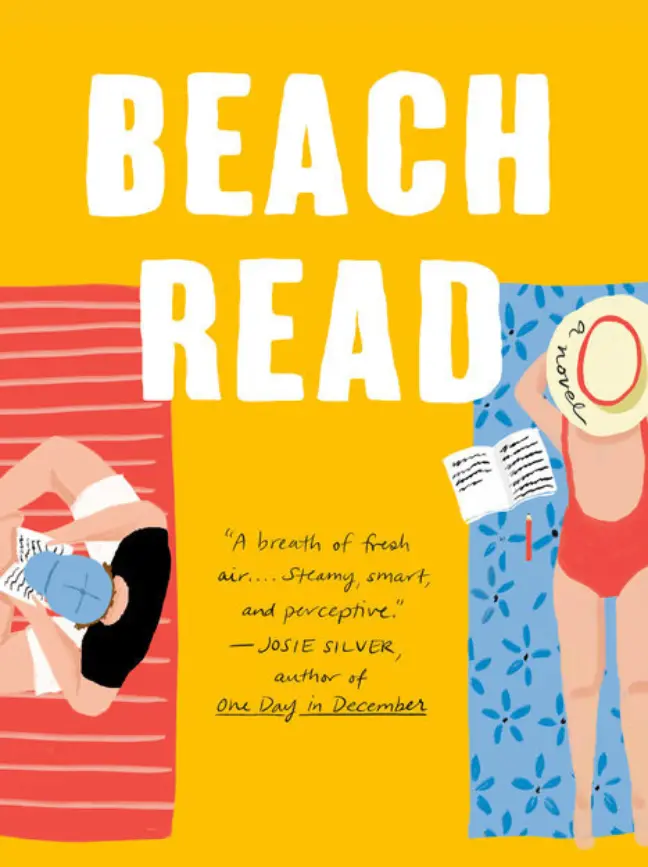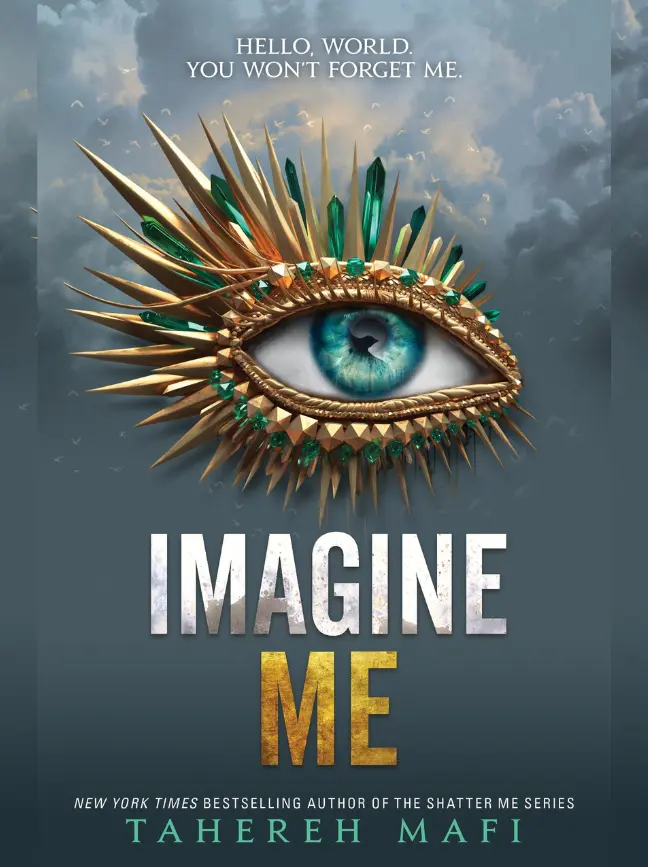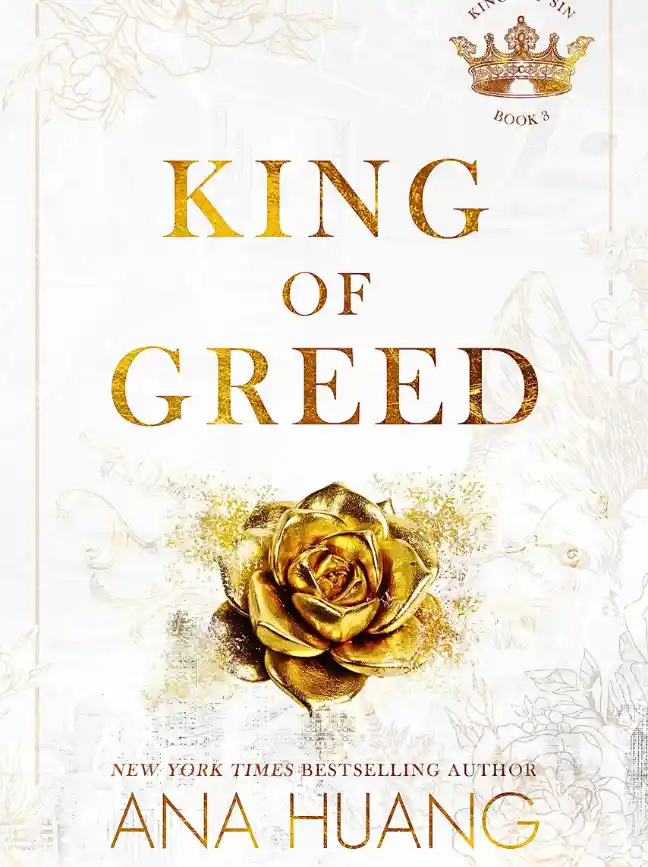I genuinely dislike being hugged.
There are very few exceptions to this rule, and Haider is not one of them. Even so, every time I see him, he insists on hugging me. He kisses the air on either side of my face, clamps his hands around my shoulders, and smiles at me like I am actually his friend.
“Hela habibi shlonak? It’s so good to see you.”
I attempt a smile. “Ani zeyn, shukran.” I nod at the table. “Please, have a seat.”
“Sure, sure,” he says, and looks around. “Wenha Nazeera . . . ?”
“Oh,” I say, surprised. “I thought you came alone.”
“La, habibi,” he says as he sits down. “Heeya shwaya mitakhira. But she should be here any minute now. She was very excited to see you.”
“I highly doubt that.”
“Um, I’m sorry, but am I the only one here who didn’t know you speak Arabic?” Kenji is staring at me, wide-eyed.
Haider laughs, eyes bright as he analyzes my face. “Your new friends know so little about you.” And then, to Kenji, “Your Regent Warner speaks seven languages.”
“You speak seven languages?” Juliette says, touching my arm. “Sometimes,” I say quietly.
It’s a small group of us for dinner tonight; Juliette is sitting at the head of the table. I’m seated to her right; Kenji sits to the right of me.
Across from me now sits Haider Ibrahim. Across from Kenji is an empty chair.
“So,” says Haider, clapping his hands together. “This is your new life? So much has changed since I saw you last.”
I pick up my fork. “What are you doing here, Haider?”
“Wallah,” he says, clutching his chest, “I thought you’d be happy to see me. I wanted to meet all your new friends. And of course, I had to meet your new supreme commander.” He appraises Juliette out of the corner of his eye; the movement is so quick I almost miss it. And then he picks up his napkin, drapes it carefully across his lap, and says, very softly, “Heeya jidan helwa.”
My chest tightens.
“And is that enough for you?” He leans forward suddenly, speaking so quietly only I can hear him. “A pretty face? And you so easily betray your friends?”
“If you’ve come here to fight,” I say, “please, let’s not bother eating dinner.”
Haider laughs out loud. Picks up his water glass. “Not yet, habibi.” He takes a drink. Sits back. “There’s always time for dinner.”
“Where is your sister?” I say, turning away. “Why didn’t you arrive together?”
“Why don’t you ask her yourself?”
I look up, surprised to find Nazeera standing at the door. She studies the room, her eyes lingering on Juliette’s face just a second longer than everyone else’s, and takes her seat without a word.
“Everyone, this is Nazeera,” Haider says, jumping to his feet with a wide smile. He wraps an arm around his sister’s shoulder even as she ignores him. “She’ll be here for the duration of my stay. I hope you will welcome her as warmly as you’ve welcomed me.”
Nazeera does not say hello.
Haider’s face is open, an exaggeration of happiness. Nazeera, however, wears no expression at all. Her eyes are blank, her jaw solemn. The only similarities in these siblings are physical: she bears a remarkable resemblance to her brother. She has his warm brown skin, his light brown eyes, and the same long, dark eyelashes that shutter shut her expression from the rest of us. But she’s grown up quite a bit since I last saw her. Her eyes are bigger, deeper than Haider’s, and she has a small, diamond piercing centered just underneath her bottom lip. Two more diamonds above her right eyebrow. The only other marked distinction between them is that I cannot see her hair.
She wears a silk shawl around her head.
And I can’t help but be quietly shocked. This is new. The Nazeera I remember did not cover her hair—and why would she? Her head scarf is a relic; a part of our past life. It’s an artifact of a religion and culture that no longer exists under The Reestablishment. Our movement long ago expunged all symbols and practices of faith or culture in an effort at resetting identities and allegiances; so much so that places of worship were among the first institutions around the world to be destroyed. Civilians, it was said, were to bow before The Reestablishment and nothing else. Crosses, crescents, Stars of David—turbans and yarmulkes, head scarves and nun’s habits—
They’re all illegal.
And Nazeera Ibrahim—the daughter of a supreme commander—has a staggering amount of nerve. Because this simple scarf, an otherwise insubstantial detail, is nothing less than an open act of rebellion. And I’m so stunned I almost can’t help what I say next.
“You cover your hair now?”
At this, she looks up, meets my eyes. She takes a long sip of her tea and studies me. And then, finally—
Says nothing.
I feel my face about to register surprise and I have to force myself to be
still. Clearly, she has no interest in discussing the subject. I decide to move on. I’m about to say something to Haider, when,
“So you don’t think anyone will notice? That you cover your hair?” It’s Kenji, speaking and chewing at the same time. I touch my fingers to my lips and look away, fighting to hide my revulsion.
Nazeera stabs at a piece of lettuce on her plate. Eats it.
“I mean you have to know,” Kenji says to her, still chewing, “that what you’re wearing is an offense punishable by imprisonment.”
She seems surprised to find Kenji still pursuing the subject, her eyes appraising him like he might be an idiot. “I’m sorry,” she says softly, putting down her fork, “but who are you, exactly?”
“Nazeera,” Haider says, trying to smile as he shoots her a careful, sidelong glance. “Please remember that we are guests—”
“I didn’t realize there was a dress code here.”
“Oh—well, I guess we don’t have a dress code here,” Kenji says between bites, oblivious to the tension. “But that’s only because we have a new supreme commander who’s not a psychopath. But it’s illegal to dress like that,” he says, gesturing at her face with his spoon, “like, literally everywhere else. Right?” He looks around, but no one responds. “Isn’t it?” he says to me, eager for confirmation.
I nod. Slowly.
Nazeera takes another long drink of her tea, careful to replace the cup in its saucer before she leans back, looks us both in the eye and says, “What makes you think I care?”
“I mean”—Kenji frowns—“don’t you have to care? Your dad is a supreme commander. Does he even know that you wear that thing”—another abstract gesture at her head—“in public? Won’t he be pissed?”
This is not going well.
Nazeera, who’d just picked up her fork again to spear some bit of food on her plate, puts down her fork and sighs. Unlike her brother, she speaks perfectly unaccented English.
She’s looking only at Kenji when she says, “This thing?” “Sorry,” he says sheepishly, “I don’t know what it’s called.”
She smiles at him, but there’s no warmth in it. Only a warning. “Men,” she says, “are always so baffled by women’s clothing. So many opinions about a body that does not belong to them. Cover up, don’t cover up”—she waves a hand—“no one can seem to decide.”
“But—that’s not what I—” Kenji tries to say.
“You know what I think,” she says, still smiling, “about someone telling me what’s legal and illegal about the way I dress?”
She holds up two middle fingers. Kenji chokes.
“Go ahead,” she says, her eyes flashing angrily as she picks up her fork again. “Tell my dad. Alert the armies. I don’t give a shit.”
“Nazeera—” “Shut up, Haider.”
“Whoa—hey—I’m sorry,” Kenji says suddenly, looking panicked. “I didn’t mean—”
“Whatever,” she says, rolling her eyes. “I’m not hungry.” She stands up suddenly. Elegantly. There’s something interesting about her anger. Her unsubtle protest. And she’s more impressive standing up.
She has the same long legs and lean frame as her brother, and she carries herself with great pride, like someone who was born into position and privilege. She wears a gray tunic cut from fine, heavy fabric; skintight leather pants; heavy boots; and a set of glittering gold knuckles on both hands.
And I’m not the only one staring.
Juliette, who’s been watching quietly this whole time, is looking up, amazed. I can practically see her thought process as she suddenly stiffens, glances down at her own outfit, and crosses her arms over her chest as if to hide her pink sweater from view. She’s tugging at her sleeves as though she might tear them off.
It’s so adorable I almost kiss her right then.
A heavy, uncomfortable silence settles between us after Nazeera’s gone. We’d all been expecting an in-depth interrogation from Haider tonight;
instead, he pokes quietly at his food, looking tired and embarrassed. No amount of money or prestige can save any of us from the agony of awkward family dinners.
“Why’d you have to say anything?” Kenji elbows me, and I flinch, surprised.
“Excuse me?”
“This is your fault,” he hisses, low and anxious. “You shouldn’t have said anything about her scarf.”
“I asked one question,” I say stiffly. “You’re the one who kept pushing—” “Yeah, but you started it! Why’d you even have to say anything?”
“She’s the daughter of a supreme commander,” I say, fighting to keep my voice down. “She knows better than anyone else that what she’s wearing is illegal under the laws of The Reestablishment—”
“Oh my God,” Kenji says, shaking his head. “Just—just stop, okay?” “How dare you—”
“What are you two whispering about?” Juliette says, leaning in.
“Just that your boyfriend doesn’t know when to shut his mouth,” Kenji says, scooping up another spoonful of food.
“You’re the one who can’t keep his mouth shut.” I turn away. “You can’t even manage it while you’re eating a bite of food. Of all the disgusting things
—”
“Shut up, man. I’m hungry.”
“I think I’ll retire for the evening also,” Haider says suddenly. He stands. We all look up.
“Of course,” I say. I get to my feet to bid him a proper good night. “Ani aasef,” Haider says, looking down at his half-eaten dinner. “I was
hoping to have a more productive conversation with all of you this evening, but I’m afraid my sister is unhappy to be here; she didn’t want to leave home.” He sighs. “But you know Baba,” he says to me. “He gave her no choice.” Haider shrugs. Attempts a smile. “She doesn’t understand yet that what we do—the way we live now”—he hesitates—“it’s the life we are given. None of us has a choice.”
And for the first time tonight he surprises me; I see something in his eyes I recognize. A flicker of pain. The weight of responsibility. Expectation.
I know too well what it is to be the son of a supreme commander of the Reestablishment—and dare to disagree.
“Of course,” I say to him. “I understand.” I really do.








